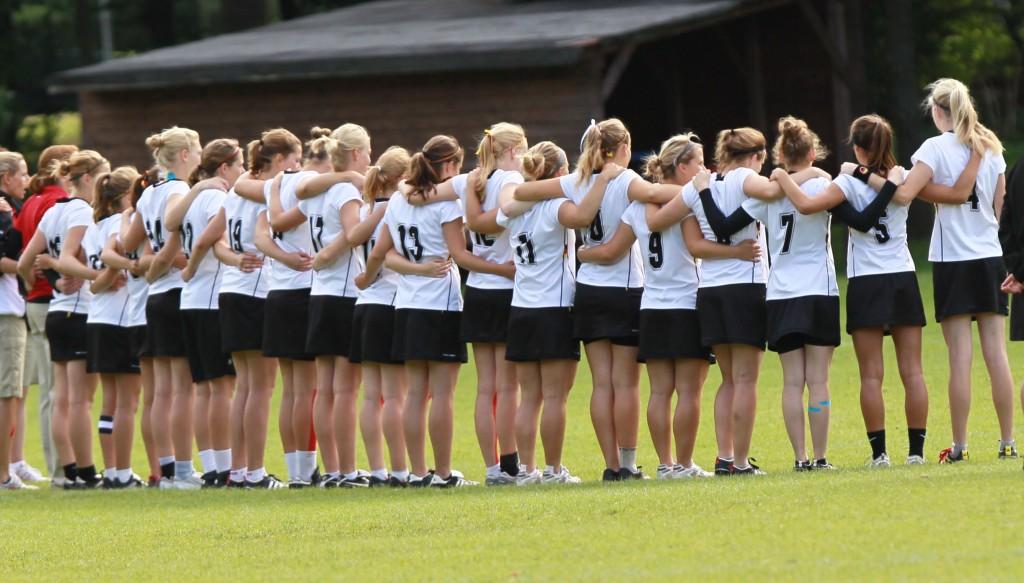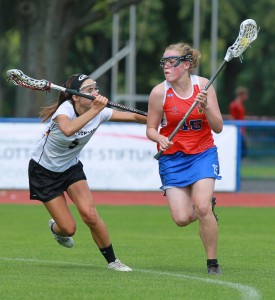There was one thing the German national team was lacking as we stood linked arm-in-arm at the opening ceremony of the U19 Lacrosse World Championship, hesitantly singing the German national anthem in front of a tremendous crowd: confidence.
Although this national hymn felt unfamiliar to me, the emotions did feel familiar. Once again I was part of a team that was relatively new and inexperienced. I knew that four years ago, this team had come in dead last. We could feel the weight of the world on our shoulders. We were the über-underdogs.
When I first picked up a lacrosse stick in fourth grade, I was told my only option would be to throw on a helmet and pads and learn how to play boys’ lacrosse. Instead, I found a team short of players that allowed me to play up with older girls, despite being half the size of most of them. It was difficult for girls’ clubs to find coaches, and even harder to get access to practice fields, competing with the more established boys’ club teams and the multitude of soccer teams.
I soon became a driven player, and at the age of 11 I was selected to represent Northern California in a tournament in Boston. This was my first exposure to the aggressive level of East Coast lacrosse, where the sport is deeply rooted. I remember my coach turning to me before a game against a massive East Coast team, informing me that I had two minutes to double in size.
When I returned to California, I was acutely aware of how far the sport needed to expand in order for our teams to compete west of Colorado, but the East Coast competition fed my determination to reach that level. I knew my passion and my love of the game would make the hard work worthwhile.
This past summer before the World Championship, I played back on the East Coast in some highly competitive college recruiting tournaments, where the familiar support from the sidelines was replaced by intimidating college coaches lined up with clipboards. It seemed all my hard work now amounted to these few moments of playing that could determine my future happiness.
The tense environment instantly created a competitive edge among team members. It changed the game, undermining the important aspects needed to succeed as a team. Players felt pressured to stand out, be a ball hog, and ruthlessly do whatever it took to be a star. The love of the game that a team projects, when at its best, seemed to fade. I returned to California two weeks before I was to leave for Europe and the World Championship training, now disillusioned by my East Coast experience. I found myself questioning what it meant to be a selfish versus a selfless team player when it came to college goals.

Nervously looking around at my German teammates as we took our positions for the first draw of the opening game, I realized that they had never experienced the pressure of impressing colleges while on the field. Most other national lacrosse players were not competing with dreams of being recruited to top universities or m , visions of later playing professional lacrosse. In Germany, the government pays for university education, so students focus solely on academics.
German student athletes are unaccustomed to much support from family, schools, and communities in comparison with American student athletes. I tried to imagine athletes I knew at home taking long train rides alone to big cities all over the country where trainings are held during weekends, or sleeping overnight on gym floors after a long day of practice.
I admired the immense work ethic and dedication each team member possessed. Every day during the World Championship, we took pride in being the only team to run to the practice fields early in the morning in the foggy rain, even on game days, rather than take the shuttle bus. Whether we were warming up on the field or spending time together in the hotel dining room with all the other teams, I was encompassed by my teammates’ tremendous enthusiasm.
I found it refreshing and inspiring that these women had all come together purely for the love of the game, despite being underdogs.
The passion my teammates showed for lacrosse did not seem to carry over, though, to their hesitant singing of the anthem before the first game. Later, some players informed me that most signs of patriotism, such as proudly singing a national anthem, have been discouraged in Germany ever since World War II. The war’s legacy has meant that German fans are careful in waving flags and displaying national pride. I thought of the exuberant patriotism Americans show, and did not recognize how unfamiliar these expressions of national allegiance were to my German teammates, and the significance their pride held for them.

I still felt thrust under a load of high expectations. Although I fulfilled the eligibility requirements for the national team — including German citizenship — and had proven myself during the tryouts held in August last year, I now faced many challenges.
Constantly speaking a different language on and off the field was a new experience that often made me nervous, as the only American on the German team. Our head coach was American, but only spoke German, even to me. I was asked to do press interviews in German that were stressful at times. More importantly, there were times under pressure on the field during a game when I worried that, on top of everything else, my German would fail me when communicating with other players.
It was clear that I needed to make adjustments to play at a different level and with a new team, while staying mentally tough. In comparison, adapting to the nine-hour time difference, the rain, and the punishing schedule demands over ten days seemed trivial.
At 16, I was almost the youngest on the team, and had not had many opportunities to build bonds with other team members, most who had played together before. Yet the coaches told me repeatedly that they were looking for me to take on a leadership role. I was concerned about being accepted both on and off the field. Yet everyone was supportive and friendly, and I really appreciated their honesty, directness, and generosity. When my team showed their excitement towards me as top scorer, or when I won Most Valuable Player after the Holland game, their support felt genuine, and made me realize just how close we had become.
The toughest frustration was simply the fact that my team came into this international competition with so many disadvantages. We had shared less training time together than other teams, and were certainly one of the least experienced. It was hard not to get upset when our inexperience undermined our hard work and determination. Yet we each improved individually over the course of the World Championship, and most importantly, we grew as a team.
None of these concerns were in my thoughts when the first whistle blew to start the opening game against the Czech Republic.
My mind was also not on the thousand pairs of eyes intensely tracking my every move, the echoes of the German national anthem, the fresh turf tearing up with each determined stride, the defender I had maneuvered past seconds before now closing in, or the desperate sticks being thrust towards the yellow ball I carefully cradled.
My focus was only on an opening of soft, white mesh, quickly vanishing behind the massive figure guarding the goal.
With the force of every muscle in my body, I instantly drove the ball down, towards the opening in goal, releasing all the pressure, frustration, and challenges I had felt building up to that moment.
“Tor für Deutschland.” Goal for Germany.
The first goal of the Lacrosse World Championship. In that moment, I felt something that every underdog, every athlete on a team that experiences a bitter loss, every person who has ever been told, “there is no chance,” feels at least once: we can do this. The “this” does not mean win, if by win it means we will have a higher number on the scoreboard by the end. It means we will do our best and have an amazing time doing it.

This realization was a turning point. While I had anticipated that the World Championship experience would leave me more frustrated than ever, it had the opposite impact, despite our losses.
My own uncertainty going in to this World Championship, as well as my team’s hesitancy in singing the German anthem, melted away over the next seven games.
Although we ended up losing to the Czech Republic 8-12, a team we had also narrowly lost to earlier in the summer during the Prague Cup, we played them again, almost beating them before losing 10-11. This was heartbreaking for many on our team, however, I was surprised to realize that I was so excited about how well we had played, that I failed to be upset about the close loss. Overall, we beat both New Zealand and Holland twice, moving up to tenth out of 12 teams, compared to our last place position four years earlier. In 2015 I am confident that the German national team will move up again, led by their passion for the sport, and undoubtedly sing the national anthem with a new pride.
Surrounded by so much passion for the sport, not only shown by the players from around the world, but shared by the officials, the coaches, the administrators, the World Cup staff and the fans, I was reminded of why I love sports, why I love being a part of a team, and why I love lacrosse.
We entered the World Championship as über-underdogs. We finished as über-underdogs. This was not a Disney film happy ending by any definition. Although my competitive nature had previously told me otherwise, I learned that it is possible to be successful and gain more from an experience after losing. There will always be losers in sports, as we all know, but it is exciting to truly discover that what we love about sports is not only connected to a score or a ranking.




